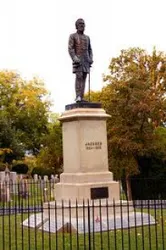In "A Defence of Virginia," Robert Lewis Dabney offers a robust intellectual justification of the South during the tumultuous period of the American Civil War. Combining historical analysis with impassioned rhetoric, Dabney crafts a narrative that delves deeply into the reasons for Virginia's secession from the Union, contextualizing it within the broader themes of states' rights and regional identity. His literary style is marked by eloquence and a profound familiarity with classical rhetoric, deploying polemical strategies that engage with contemporaneous debates over morality, governance, and sovereignty, revealing the complexities of Southern thought during a time of division. Robert Lewis Dabney, a prominent Southern Presbyterian minister and theologian, possessed an acute awareness of the ideological battleground of his day. His experiences as a chaplain in the Confederate army and his scholarly pursuits in theology and philosophy profoundly shaped his perspectives on the issues of his time. Dabney's work reflects a fervent commitment to the Southern way of life, driven by a desire to articulate and defend what he perceived as the ethical and constitutional legitimacy of Virginia's actions during the Civil War. Dabney's "A Defence of Virginia" is an essential read for those seeking to understand the complex and often contentious narratives surrounding the Civil War and Southern identity. Scholars, historians, and general readers alike will find in this work a rich tapestry of thought-provoking arguments and vividly articulated ideals that continue to resonate in contemporary discussions of regionalism and national identity.

Læs og lyt gratis i 14 dage
Opsig når som helst
Prøv gratis nu
